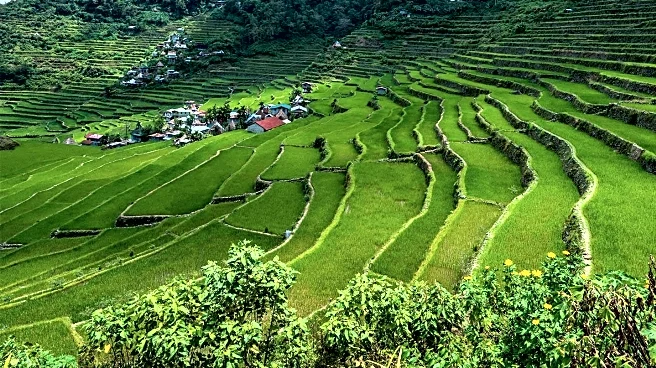What's Happening?
In Agusan del Sur, only 7% of college students are enrolled in agriculture-related courses, according to the Commission on Higher Education (CHED) in the Caraga Region. This statistic has prompted local officials to encourage more students to pursue agriculture as a career.
The Agusan del Sur State College of Agriculture and Technology (ASSCAT) is at the forefront of this initiative, with plans to offer a Bachelor of Science in Agriculture majoring in Soil Science. The move aims to develop local expertise in sustainable farming and soil management. The provincial government, led by Gov. Santiago Cane Jr., is offering full scholarships for agriculture courses to attract more students. The province also boasts a state-of-the-art soil laboratory to train future agriculture technologists. The AgSur Future Forum, held on October 17, emphasized the importance of agriculture in securing the province's food future amid climate change challenges.
Why It's Important?
The initiative to increase enrollment in agriculture courses is crucial for Agusan del Sur's economic and environmental sustainability. By fostering a new generation of farmers skilled in science and technology, the province aims to enhance its agricultural productivity and resilience to climate change. This effort could lead to improved food security and economic stability in the region. The focus on agriculture education also aligns with broader national and global trends emphasizing sustainable development and climate adaptation. The success of this initiative could serve as a model for other regions facing similar challenges, potentially influencing educational and agricultural policies at a larger scale.
What's Next?
ASSCAT's transition to a state university is pending, contingent on meeting requirements set by CHED. Once achieved, this could further enhance the institution's capacity to offer diverse and advanced agricultural programs. The provincial government's scholarship program is expected to increase student enrollment in agriculture courses, potentially leading to a more skilled workforce in the sector. As more students engage in agriculture, the province may see advancements in agricultural practices and technologies, contributing to higher yields and better resource management. The ongoing support from local officials and educational institutions will be critical in sustaining this momentum.
Beyond the Headlines
The push for agriculture education in Agusan del Sur highlights the intersection of education, economic development, and environmental sustainability. It underscores the role of education in empowering youth to address complex challenges like climate change and food security. This initiative also reflects a cultural shift towards valuing agriculture as a viable and prestigious career path, which could alter societal perceptions and encourage more young people to enter the field. The long-term impact of this effort could lead to a more self-reliant and resilient community, capable of adapting to future challenges.
















